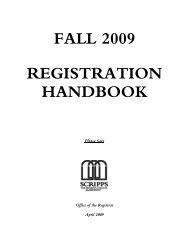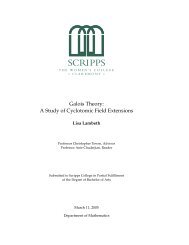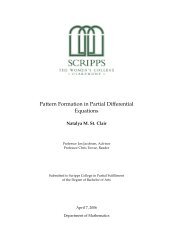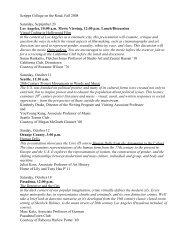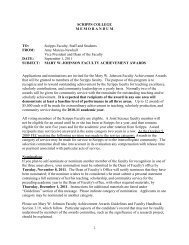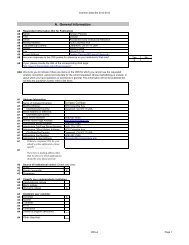Sophie Germain: mathématicienne extraordinaire - Scripps College
Sophie Germain: mathématicienne extraordinaire - Scripps College
Sophie Germain: mathématicienne extraordinaire - Scripps College
You also want an ePaper? Increase the reach of your titles
YUMPU automatically turns print PDFs into web optimized ePapers that Google loves.
<strong>Sophie</strong> <strong>Germain</strong>’s Theorems 60<br />
For <strong>Sophie</strong> <strong>Germain</strong> primes p, we know q = 2p + 1 so q − 1 = 2p. In<br />
particular,<br />
n q−1 ≡ n 2p (mod q)<br />
≡ (n p ) 2 (mod q)<br />
≡<br />
1 (mod q).<br />
We can then write (n p ) 2 − 1 ≡ 0 (mod q) which we factor to get<br />
(n p − 1)(n p + 1) ≡ 0 (mod q). We now see that n p ≡ ±1 (mod q) for all integers<br />
n such that n ≢ 0 (mod q).<br />
We need to show that p ≢ ±1 (mod q)<br />
Claim 5. 2. For a <strong>Sophie</strong> <strong>Germain</strong> prime pair p and q = 2p + 1, we know that<br />
p ≢ ±1 (mod q).<br />
Proof of Claim 5.2.<br />
Assume p ≡ ±1 (mod q). Then p ± 1 ≡ 0 (mod q), so<br />
q divides p ± 1. But we defined p and q such that q = 2p + 1 = p + p + 1, so<br />
q > p + 1 > p − 1. Thus q does not divide p ± 1 and p ≢ ±1 (mod q). □<br />
We return to our proof of the <strong>Sophie</strong> <strong>Germain</strong> Primes Theorem. We<br />
know n p ≡ ±1 (mod q) ≢ p (mod q) for all integers n ≢ 0 (mod q).<br />
Now suppose n ≡ 0 (mod q). Then n p ≡ 0 (mod q) ≢ p (mod q).<br />
Thus condition 1 holds for all integers n if p is a <strong>Sophie</strong> <strong>Germain</strong> Prime.<br />
Let us consider the integer solutions x, y, and z. We showed above that



